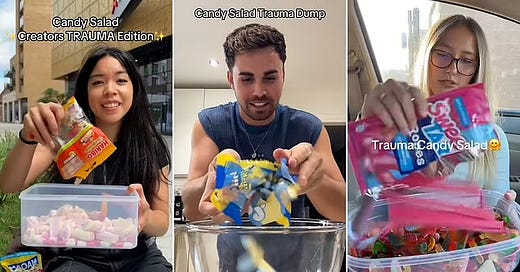On the Monetization of Trauma
It is no secret to the marketing majors of the world that Gen Z is a mentally ill generation. The explosion of mindfulness apps, the pervasive advertisements for online therapy service BetterHelp, and the amount of “soul healing” morning routine videos on YouTube lend credence to that idea. That, and the number of ads that I see pushing the misleading claim that hypersexuality is a symptom of ADHD and that I should really get checked out.
Establishing a mental illness as the forefront of one’s personality is now a way to cultivate an in-group, establish minority status, and garner material success. Filming one’s psychotic breaks, overeating binges, and dissociation alter-switches have become commonplace. Before YouTube became popular, emo kids used clothing, music, makeup, and sullen attitudes to communicate their in-group status. Now, the once-stable emo kids are splintered across psychological lines; you have the ADHD kids, the trans kids, the dissociative identity kids, the anorexia and bulimia kids, the Tourettes kids, and the autistic kids.
As YouTube and Tumblr slowly conquered the cultural conversation on the internet, monetizing one’s trauma and mental illness became commonplace. Amanda Todd posted a video of her suicide note that went viral. Then Eugenia Cooney, a girl suffering from severe anorexia, became a proto-influencer who thrived off the controversy that her skin-and-bones appearance elicited in her audience. A torrent of tearful coming-out videos was not far behind.
A Gen Z spin on this trend has caught my eye recently. Unlike the millennial monetization of trauma and mental struggles, Gen Z adds the generation’s classic cynicism and blasé attitude to their stories. Gone are the tears, the slow motion, and the Linkin Park and Bon Iver tracks in the background. Instead, we have the polar opposite: young people making light of horrible events by assembling a “trauma salad.”
In this “trauma salad” video, a young girl starts off strong: “Hi, I’m McKenzie and my father killed my mom.” She then concludes by stating that she brought the bowl for the salad. In like fashion, other people declare their trauma and then add some sort of sweet confection to the “trauma salad.” Other examples of this trend are here, here, and here.
I’ll admit it — some of these videos are funny in a sort of black, gallows humor way. Humor can be a good salve, especially if the trauma discussed is remote and the person telling the joke has since healed. But for the folks in these videos, many of whom have seemingly not healed, there may be such a thing as too much disclosure.
I think only a few short years ago, I would have said that these issues should be discussed solely with a therapist. That may still be a good route for those who are really struggling. But for the majority of the so-called “mentally ill” crowd, it could be better not to talk about their feelings with a therapist, as it can lead to more rumination. Jordan Peterson is correct when he says that constantly detailing our mental states and putting a lot of stock into our feelings is a recipe for depression and anxious spiraling.
I highly doubt our hunter-gatherer ancestors were concerned about their ADHD symptoms flaring up mid-hunt, is what I’m trying to say. Shayne Smith, a stand-up comedian turned Christian, recently echoed this, claiming that we are overmedicated and many of us (his past self included) do not attempt to do anything about our mental health struggles before immediately using medication to numb the pain. He also said that the more mentally ill he acted online, the more he was rewarded for it.
This aligns with other posts here on Substack detailing toxic ex-partners who suddenly identify as autistic to escape criticism. It seems that people are paying the ever-growing percentage of hack doctors and mental health professionals to give them an invisible diagnosis that no one can question, lest they be labeled ableist. It’s a page straight out of the Critical Race Theory handbook, and the strategy is working famously.
Oversharing online is not likely to stop anytime soon, and this may prove to be unfortunate for Gen Z and Gen Alpha in the future, especially regarding employment and marriage. Does anyone else remember that girl who lost (and subsequently regained) her internship at NASA for telling an influential NASA overseer to “suck my dick and balls?” Well, imagine that happening to you, but instead of a single clapback tweet sinking your career, it’s a 2009 video of you showcasing your obviously fake Tourette tics.
Our culture is lying to young people when it claims that unadulterated transparency about mental health is always a good thing. Employers will never say this — lest they get sued — but no one wants a worker with panic attacks and a fursona to be in charge of the company finances, let alone the company picnic. Mental health struggles are real and should be shared with friends, family, and therapists. But maybe don’t post about your trauma salad.




